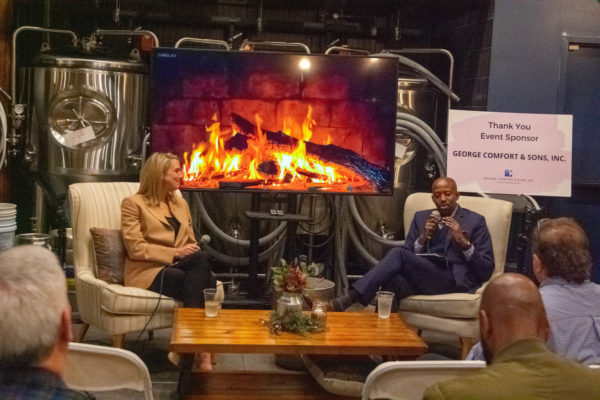Stamford Mayor Simmons speaks to city’s future in ‘fireside chat’
Stamford Mayor Caroline Simmons made her first public remarks since her swearing in at a Dec. 15 “Fireside Chat” hosted by the Stamford Partnership’s TechHub program and sponsored by commercial realty company George Comfort & Sons.
The chat was held in a tightly packed room at the rear of Half-Full Brewing’s Third Place, a coworking space, which was hailed as symbolic of the city’s growth by both Simmons and her interlocutor George Boyce, owner of the Stamford State Farm insurance agency and an executive board member of Stamford Downtown.
Seated in front of active brewing equipment and a “virtual” fireplace in the form of a television playing a loop of a log fire, Simmons and Boyce discussed both her first 10 days in office and the city’s future while surrounded by a crowd composed of entrepreneurs and members of the Stamford Partnership.
“The first 10 days have been incredible, a whirlwind,” Simmons responded when Boyce asked for her thoughts on her term thus far. “Though I’m still looking for my parking spot, full disclosure. But we’ve had some incredible meetings with city employees and we’re trying to get to every floor in the government center.”
Simmons stressed the importance of spending her first day visiting key infrastructure projects around the city, a campaign trail promise. She took along the city’s relevant experts as guides.
“We were looking at infrastructure projects that need attention,” she said. “We went to the train station, the South End, we went to parks and playgrounds. We looked at intersections of roads, and sidewalks. So, please let us know -— we’re all ears if your road needs to be paved or you need an improvement on the street, we want to hear.”
“Hope Street.” a man in the crowd called, eliciting laughs, the night’s sole interruption during the wide-ranging discussion.

Simmons acknowledged the need for repairs along the highly traveled throughfare with good humor and reiterated that she has hit the ground running and is already working on preparing the city for winter weather. She also stressed the importance of preparing for the extreme weather that will be brought by climate change.
“The New England coast is more densely populated than Florida, South Carolina and North Carolina combined,” Boyce observed when the conversation turned toward climate change and resiliency. He noted that as an insurance agent with prior experience in disaster-focused coverage, this issue was a priority for him, asking, “What’s our resiliency plan? How are we looking as a city?”
“On our infrastructure tour this was the question I was asking our engineers,” Simmons responded. “How prepared are we with sea levels expected to rise five to 10 feet in the next couple of decades? How prepared are we as a city for the next storm?”
Simmons indicated there was still work to be done in fully assessing these projects but held out hope that working with the Federal Emergency Management Agency and acquiring federal funding will allow not only for needed repairs and upgrades of Stamford’s infrastructure but also building the basis for a more energy-efficient and less vulnerable city.
Audience questions included inquiries into what can be done to improve the reputation of the city’s schools, and specifics of her plan to create a “one stop shop” for permitting.
Describing improving the view of schools as a top priority of her administration, Simmons indicated that the presence of students who speak other languages should be embraced as a strength.
“I think we need to do a much better job of marketing our schools,” she stated. “We have incredible teachers, incredible programs at our schools. We have students who went on to Ivy league schools, we have incredible successes, and I think we need to do better selling our international population of students who get to go to school alongside people that speak 65 different languages from all over the world.”
Her plan for permitting involved creating an “Amazon-like” interface where a single ID and login will be used throughout the entire permitting process, alongside designated days where representatives of every department will be in one room to work together with applicants. The combined meetings could grow out of the Citizen Service Hubs, where city employees set up shop in underserved parts of the city to provide easier access. Simmons noted that 30 people lined up for the first Hub, which was held in the South End.
Boyce insisted that Simmons ask him some questions as the chat was intended as a dialogue. She asked him what his outlook on the city was, and he reflected on how he chose the city for its growth potential, renting space in Landmark Square when the downtown area had a reputation as dangerous. He said he joined Stamford Downtown to help foster change and that Sandy Goldstein, the president at the time had a unique benchmark: “You’ll know when we’ve arrived when you see strollers.”
“And I’m telling you,” he continued, “now I have to duck strollers every time I come out of my front door.”
Simmons, who is expecting her third child, agreed that this was an indicator of both how far the city has come and hope for what the future might hold.